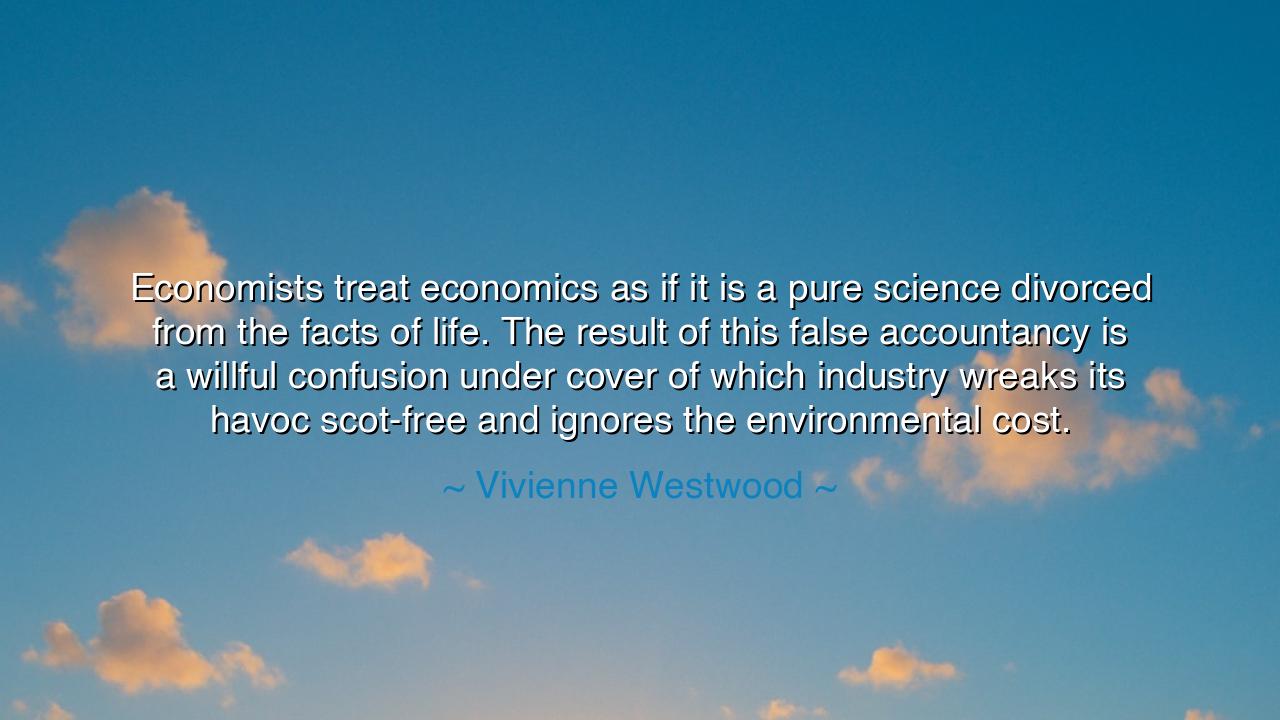
Economists treat economics as if it is a pure science divorced
Economists treat economics as if it is a pure science divorced from the facts of life. The result of this false accountancy is a willful confusion under cover of which industry wreaks its havoc scot-free and ignores the environmental cost.






The words of Vivienne Westwood, “Economists treat economics as if it is a pure science divorced from the facts of life. The result of this false accountancy is a willful confusion under cover of which industry wreaks its havoc scot-free and ignores the environmental cost,” ring with both indignation and prophecy. They cut through the illusions of numbers and charts, reminding us that wealth, when calculated without the measure of the earth, is a hollow deceit. To separate economics from life itself is to weigh gold and ignore the bleeding hands that mined it, to count profit and disregard the poisoned river. Westwood, designer and rebel, speaks with the voice of one who has seen the glittering mask of commerce and torn it aside to reveal the truth.
The origin of this statement lies in Westwood’s lifelong defiance of convention. Known not only for her art in fashion but for her fiery stance on environmental and social issues, she saw that the great systems of trade and industry cloak themselves in the sterile language of “growth” and “efficiency.” In this language of supposed science, there is little space for the forests cut down, the species extinguished, or the children laboring in factories. Her words condemn this false accountancy, this deliberate blindness that allows destruction to march forward while being recorded as success.
History offers us a grim example in the story of the Dust Bowl of the 1930s. Economists and policymakers praised the expansion of agriculture in America’s Great Plains, counting the harvests and the profits as signs of prosperity. Yet they ignored the facts of life: the fragile soil, the delicate balance of rainfall, the warning whispers of the land. Industry plowed without restraint, encouraged by profit and metrics of growth. The result was catastrophe: winds that blackened the sky, families driven from their homes, and an environmental collapse that no ledger had foretold. This is the havoc that arises when economics is severed from nature.
Westwood’s words remind us that industry is not a force of nature but a creation of human choice, and thus accountable to the earth it exploits. When allowed to operate in the shadows of willful confusion, it consumes forests, fouls rivers, and burns skies—yet calls this devastation “progress.” But when economics is joined once more with the truth of life, it can become a noble steward, directing innovation toward harmony, and measuring wealth not only by coins but by clean air, fertile soil, and thriving communities.
The lesson here is sharp and undeniable: beware the numbers that ignore the soul of the world. To count profit while excluding environmental cost is to embrace a lie. True wealth is not what lies in the vault, but what lies in the rivers, the fields, the forests, and the health of the people. If we are to survive as a species, our accountancy must change. The balance sheets of tomorrow must weigh not only money but the cost to water, to soil, to sky, to all living things.
For us as individuals, the path of wisdom is to question, to pierce through the illusions of cheap goods and endless consumption. Ask: what was the cost of this garment, this gadget, this meal—not in coins, but in forests, in waters, in human dignity? Support businesses that honor sustainability, demand transparency from industries, and refuse to be lulled into the slumber of false numbers. Each choice becomes a line in the true ledger of the earth.
Thus, let Westwood’s cry be remembered: “Economists treat economics as if it is a pure science divorced from the facts of life…” Do not be deceived by the sterile mask of profit that hides destruction. Unite science with conscience, wealth with responsibility, progress with reverence. Only then will humanity escape the falsehood that calls ruin prosperity and dares to name devastation as growth. Let us live as guardians of truth, refusing false accountancy, and writing instead the true balance sheet of life, in which every river, every tree, and every breath is counted as treasure beyond price.






AAdministratorAdministrator
Welcome, honored guests. Please leave a comment, we will respond soon